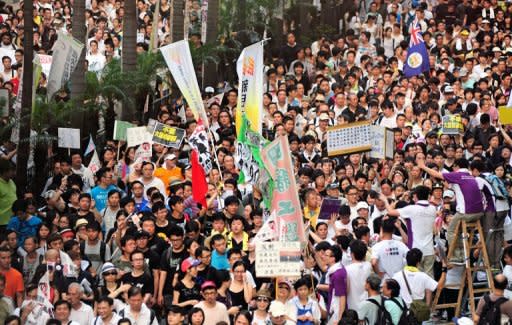China netizens slam Hu for evading Hong Kong protests
Chinese web users accused President Hu Jintao of "hiding" from protesters in Hong Kong Sunday even as state media covered the anniversary of the city's return to rule by Beijing in glowing terms. Images of Hu visiting the former British colony to mark the 15th anniversary of its return to Chinese sovereignty received front-page coverage by major newspapers and led off news broadcasts. But China's outspoken web users used the event to criticise the government even as some keywords related to the protests appeared to be blocked on popular microblog services, indicating censors were at work to limit discussion. The official Xinhua news agency said foreign media which had predicted the city's "death" were proved wrong, asserting that Hong Kong had prospered under Chinese rule. "The city... is thriving after 15 years of its return from the colonial rule of Britain," it said. Chinese bloggers however accused Hu of "hiding" on his visit as tens of thousands of anti-Beijing protestors took to the streets of Hong Kong, adamant the anniversary was not worth celebrating. "A state leader who hides while inspecting a region... who does not dare face the appeals of the people," wrote one user on Sina's microblog service. The Chinese leader flew out shortly before noon, ahead of an annual rights rally expected to see tens of thousands of people take to the streets. "How many people will take to the road on July 1?" said another blogger Yuan Wang. On Saturday police used pepper spray to push back a few dozen demonstrators who tried to get past barricades near Hu's hotel. Some webusers questioned the Chinese state media for ignoring such events. "Can there be a live broadcast of the 'walk' by Hong Kong people?" asked one web user, referring to the protests. Internet searches using terms such as "Hu Jintao visits Hong Kong" and "Hong Kong protest" yielded few or no results on microblogs on Sunday. China regularly blocks Internet searches under a vast online censorship system known as the Great Firewall of China, but the growing popularity of microblogs similar to Twitter has posed a new challenge.



